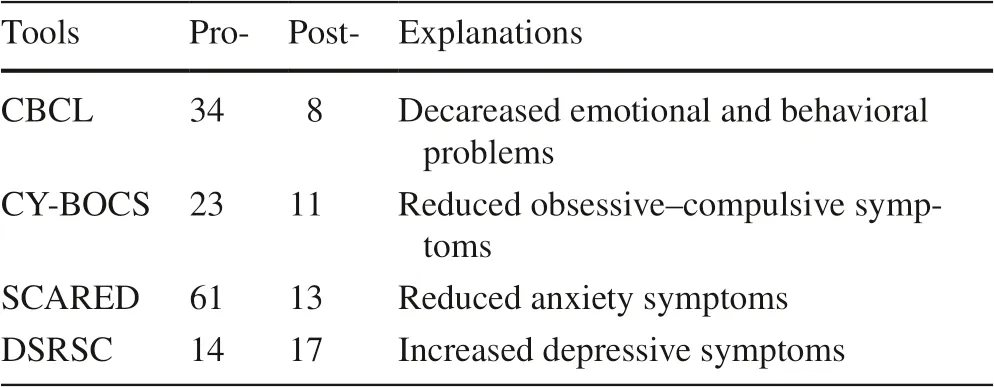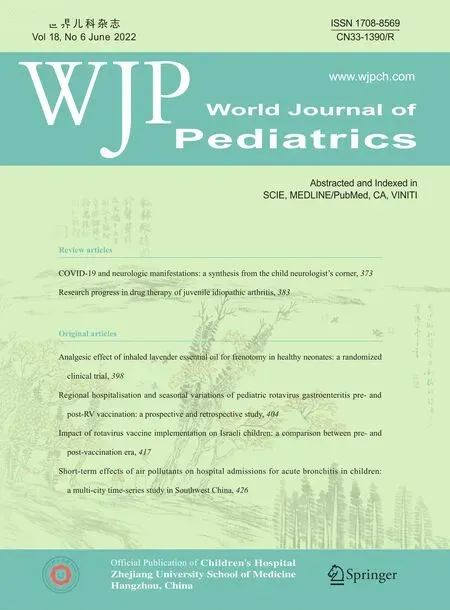Trichotillomania occurs during the COVID-19 pandemic in an adolescent
ue Wang ·Bin Zhang , 2 iD X
A13-year-old boy presented with a 1-week history of hair loss on the scalp. Physical examination revealed linear alopecia with the normal scalp (Fig.1 a). Trichoscopy examination revealed irregular black dots, flame hair, and V sign (Fig.1 b). After a detailed inquiry, the patient finally admitted that he had pulled his hair down every night. The boy was then referred to the Psychology Clinic of the hospital. In the psychiatry visit, psychological scales (Children's Yale-Brown Obsessive–Compulsive Scale, Screen for Child Anxiety Related Emotional Disorders, Depression Self-Rating Scale for Children and Child Behavior Checklist) indicated a high level of anxiety due to isolation during the COVID-19 epidemic. A diagnosis of trichotillomania was made. Trichotillomania is a compulsive desire or habit to pluck the hair, which is frequently associated with anxiety or depression [ 1]. Pathulos et al. reported that the COVID-19 pandemic led to hair-pulling symptoms increased in the patients with the body-focused repetitive behaviors that include trichotillomania, nail biting, and skin picking [ 2]. In additional, three cases of trichotillomania in children were reported which might be induced by bored mental, because the schools closed in the COVID-19 outbreak [ 3]. In our case, long-time separation from parents and lack of outdoor activity during the COVID-19 pandemic could be the cause. After 4 weeks of behavior modification therapy in the Psychology Clinic, the patient’s alopecia achieved full remission (Fig.1 c). We also summarize detailed psychological assessment scores before and after interventions in Table 1. This case reminded us that more attention should be paid to the mental health of children affected by the COVID-19 pandemic.

Table 1 The psychological assessment pro- and post-intervention
Acknowledgments The authors would like to acknowledge Ying Li (Department of Psychology in Beijing Children’s Hospital of Capital Medical University) and the pediatric patient and his parents.
Author contributions XW: software and writing–original draft preparation; BZ: reviewing and editing.
Funding The Special Fund of the Pediatric Medical Coordinated Development Center of Beijing Hospitals Authority (XTZD20180502) and Beijing Natural Science Foundation (7222058). Data availability statement Our article did not generate any research data.
Declarations
Conflict of interest No financial or non-financial benefits have been received or will be received from any party related directly or indirectly to the subject of this article.
Ethical approval This study has been approved by Ethical Committee of Beijing Children's Hospital.
Consent for publication Written consent for publication of the case details together with imaging or videos have been obtained from the parents.
 World Journal of Pediatrics2022年6期
World Journal of Pediatrics2022年6期
- World Journal of Pediatrics的其它文章
- Instructions for Authors
- Applications of mPCR testing reduced initial antibiotic use and duration of mechanical ventilation in virus-infected children with severe community-acquired pneumonia admitted to the PICU
- Serum homocysteine, lipid profile and BMI as atherosclerotic risk factors in children with numerical chromosomal aberrations
- Neonates are more vulnerable to symptomatic SARS-CoV-2 infection than children: a matched cohort study in Brazil
- Short-term effects of air pollutants on hospital admissions for acute bronchitis in children: a multi-city time-series study in Southwest China
- Impact of rotavirus vaccine implementation on Israeli children: a comparison between pre- and post-vaccination era
